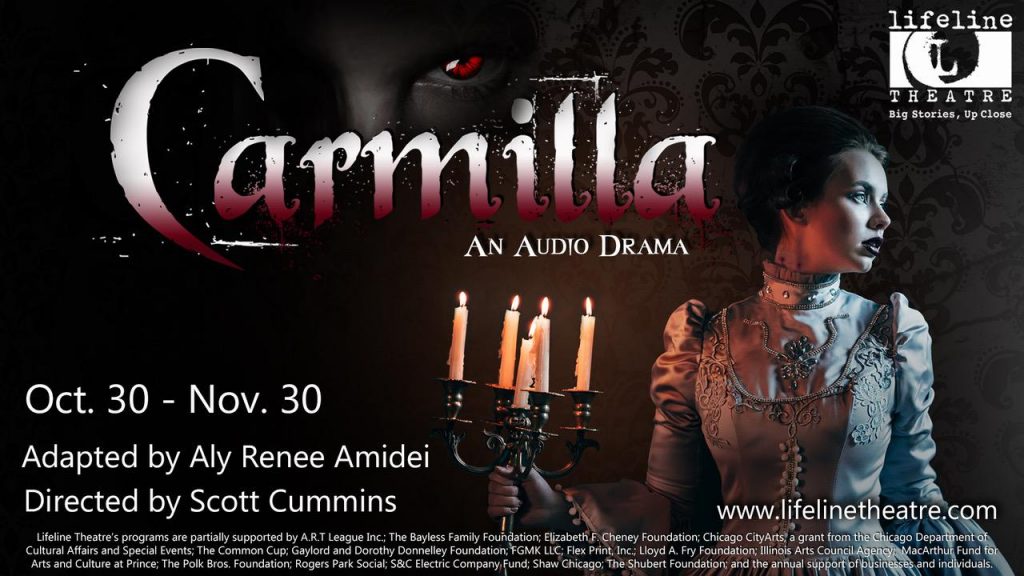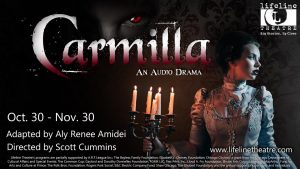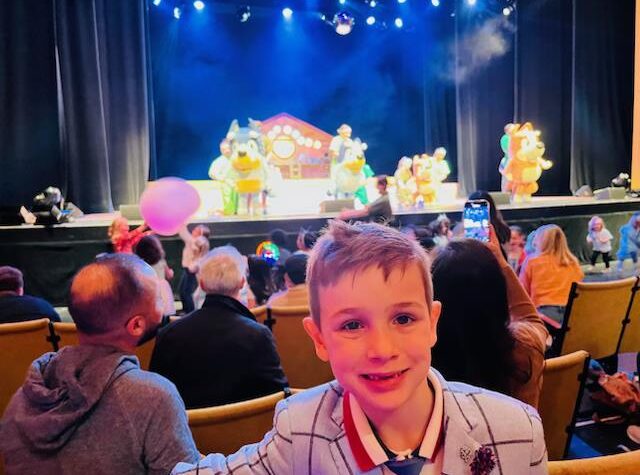
 **1/2 stars Chicago’s Lifeline Theatre has a new take on the classic vampire story “Carmilla,” which is available online as a three-part audio drama, adapted by Aly Renee Amidel and directed by Scott Cummins.
**1/2 stars Chicago’s Lifeline Theatre has a new take on the classic vampire story “Carmilla,” which is available online as a three-part audio drama, adapted by Aly Renee Amidel and directed by Scott Cummins.
Published in 1872, “Carmilla” is one of the most skillfully crafted vampire tales ever written. Irish writer J. Sheridan LeFanu’s novella exudes a tension which is at once supernatural and sexual: “I experienced a strange tumultuous excitement that was pleasurable… mingled with a vague sense of fear and disgust… I was conscious of a love growing into adoration, and also of abhorrence.” When he wrote the now much better known “Dracula” 25 years later, Bram Stoker also made liberal use of muted eroticism. In his novel, too, the vampire’s victims often display an ambivalent reaction to their assailants. As literary critic James Twitchell has pointed out, the modern vampire, as reinterpreted for us by the Romantics, “is not only interested in blood, he is interested in the process of seduction and forbidden possession… And what ‘evil’ he does is strangely attractive to his victims.”
At its heart, the original “Carmilla” is all about romantic and sexual seduction. The possession there was doubly forbidden — dealing with what was (for its time) the transgressive idea of same-gender desire as well as a more literal blood lust. But, the beauty of LeFanu’s story lies in its subtlety: it is not overtly horrific. And, its eponymous predator reciprocates the passion felt by the object of her desire. That mutuality of feeling is far from evident in the first part of the new audio drama. Here, the story begins with a prologue, invented for this play, in which the title character snarls and hisses like a beast. Her seductive ways seem to be mere artifice, designed to beguile her prey. A new character, invented for this play, says that Carmilla, like a distaff, supernatural version of Don Juan, finds pleasure in “the fascination, the pursuit, the stratagem… You like that part best… an artful courtship, yearning for sympathy and consent. You want their love first, before their blood: a most cruel betrayal.” In the play, we are thus told outright that the seducer’s shared confidences, expectant glances, and tentative caresses are nothing but deception and ruse. The novella had a more complicated and ambiguous view of its characters and their relationship. There was predation, yes, but there was also what appeared to be genuine mutuality of affection.
The story is set in mid-19th century Styria (southern Austria): Part of its charm derives from its antique time and place. The play boasts a plethora of accents — British, German, French, and what sounds like Hollywood’s idea of Transylvanian. The accents, guided by Elise Kauzlaric, are technically competent; but, they are also a needless distraction in their varied and exuberantly spoken tones. The accents draw too much attention to themselves; it would be better to jettison some or all of them and instead hew to a mid-Atlantic common speech for all of the characters. A case in point: when assuming a new persona, Carmilla sounds vaguely English and comes across as more authentic than when she reverts to her true identity as one of Bela Lugosi’s cousins. The cast has talent, but the presentation of lines here feels sometimes arch, sometimes anachronistic (a surprisingly earthy governess), and always too fever-pitched. The dialogue is always in high-octane mode and excitable. Why not throttle back for calmer, more subdued moments, and much more mutability in the pace and pitch of conversation? Among the cast, Destini Huston makes an impression of the young ingenue Laura; and Michaela Petro’s Carmilla is best when adopts the speech of a young lady (even if she always sounds more mature in years than her intended match) and leaves the haughty, heavily-accented Countess persona behind. Jenifer Tyler plays two roles, bringing the comic relief as the mischievous, carnally-minded governess.
The audio play version of “Carmilla” will entertain both genre buffs and, more generally, those who enjoy Gothic romanticism. But, the play opts to interpret the story first and foremost as a horror story (complete with conventional tropes like a clap of thunder). Much of the subtlety and ambiguity of the source material is missing here, in favor of a straight-forward tale of predator and prey. The added prologue ostensibly introduces a major wrinkle into the story with a newly invented character and backstory; but it comes at the grave cost of undermining our suspense about who’s who and what’s motivating them. Only the most basic motivation really remains here — unnatural hunger dressed up with a predilection for emotionally toying with the intended victim. There was room for much more complexity and nuance. But, Laura makes a convincing heroine in danger. And, the script has its moments — as in Laura’s unknowingly ironic observation that, “Never has something so exciting happened [to me],” and part one’s nicely understated closing words, “My name is Carmilla.”
“Carmilla” is a streaming-on-demand audio presentation of Lifeline Theatre, in Chicago, available for listening through November 30, 2021.
Starting October 30th, the three Carmilla episodes are premiering one by one, weekly on Saturday. Each episode is approximately 44 minutes long.
Tickets are “name your price” for full access and are available for purchase through http://lifelinetheatre.com/performances/2021-2022/carmilla-audio-drama/.
Ticket holders will receive a password to a private webpage where the episodes can be found.
For any questions, contact the Box Office at 773-761-4477 or email at info@lifelinetheatre.com.
For information about future shows, current initiatives, and general information about Lifeline Theatre, or to make a donation, visit: http://lifelinetheatre.com/
To see what others are saying, visit www.theatreinchicago.com, go to Review Round-Up and click at “Carmilla”






More Stories
“Bluey’s Big Play” reviewed by Tommaso Casati
“Beautiful: The Carole King Musical”
“Mamma Mia!” Reviewed by Paul Lisnek